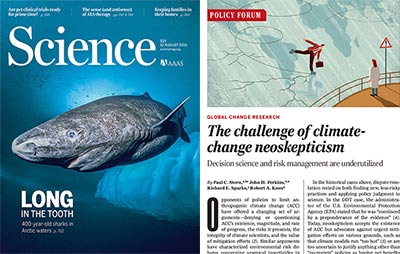Four members of the class of 1964 have published a scientific paper and coined a new term for use in the discourse on climate change, all as a result of their 50th Amherst reunion.
That reunion, in 2014, centered on the theme of “the world we inherited and the world we would leave behind,” says Paul Stern. He and John Perkins, Richard “Rip” Sparks and Bob Knox did extensive research and writing as they helped to organize a panel on climate change. Stern led the panel for an audience of classmates, some of whom were skeptical about the matter.
The discussion continued, mainly through email, long after the reunion. It led the panel organizers to commentary from high-profile skeptics of climate change, including scientists Steven E. Koonin and Judith Curry and journalist Christopher Monckton. Recently, faced with mounting evidence and widespread scientific consensus on global warming, these skeptics “seem to have changed their position to ‘Well, it’s happening, but it’s no big deal, and doing anything about it would be terribly costly and disruptive.’”

Therefore, the classmates wrote, scientists must strive not just to measure climate change and its physical effects but also “to inform decision making under uncertainty and to improve communication and education” about the issue. They call for more research in the social sciences and economics to help illuminate how human beings interact with the environment.
This call for an interdisciplinary approach reflects the authors’ academic and professional paths. Knox has a Ph.D. in oceanography and is an emeritus research oceanographer at the Scripps Institution of the University of California, San Diego. Sparks went from the Peace Corps to paleontology to aquatic toxicology, directed research programs on the Mississippi and Illinois Rivers, and now chairs a science advisory committee for the Nature Conservancy.
Perkins earned a Ph.D. in biology; helped found the graduate program in environmental studies at Evergreen State College; and has written books on the Green Revolution, the history of pesticides and the future of energy.
Stern has a background in psychology and understands environmental problems to be rooted in human behavior. He’s now in phased retirement from the National Academy of Sciences—National Research Council.
“You see what happens when you get people together with different disciplinary backgrounds who can talk to each other?” Stern says. “I think I can say for everybody that we really enjoyed the collaboration and are open to doing more, but we’re not exactly sure what next.”
Nor are they sure what’s next for environmental policies under President Trump, who has called climate change “a hoax.” That’s not neoskepticism or even traditional skepticism, they say—that’s denial.
But, Sparks says, even his neighbors in rural Illinois who support Trump have noticed “more frequent and more intense” flooding along the Mississippi in recent years. When he talks to people about climate change in terms of its immediate effects, “they want to do something about it.”
Katherine Duke ’05 is the magazine’s assistant editor.
